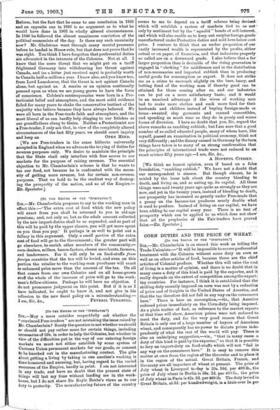[To THE EDITOR OF TSB "SPEOTATOB.n STE,—May a mere outsider
respectfully ask whether the "convinced Free-traders" are not mistaking the issue raised by Mr. Chamberlain P Surely the question is not whether we should or should not pay rather more for certain things, including necessaries of life, in order to help the Colonies, but whether in view of the difficulties put in the way of our entering foreign markets we must not either establish by some system of Customs Union permanent markets for our goods, or consent to be knocked out in the manufacturing ;contest The gibe about getting a living by taking in one another's washing is time-honoured and amusing, but, having regard to the varied resources of the Empire, hardly in point I am not interested Hi any trade, and have no doubt that the present state of things will last my time without landing me in the work- house, but I do not share Sir Boyle Roche's views as to our duty to posterity. The manufacturing future of the country seems to me to depend on a tariff scheme being devised.! which will establish a system of markets tied to us not • only by sentiment but by the " squalid " bonds of self-interest, and which will also enable us to keep out surplus foreign goods manufactured under Protective duties and sold here below cost price. I venture to think that an undue proportion of our vastly increased wealth is represented by the profits, either actual or on paper, of financiers, and that industries properly so called are On a downward grade. I also believe that a far larger proportion than is desirable of the rising generation is engaged in " clerking " for middlemen and in the distribution of non-necessaries and imported rubbish than in producing . useful goods for consumption or export. It does not strike me as a crime to encroach slightly on the beer, baccy, and betting fund of the working man if thereby good can be attained for those coming after us, and our industries• can be put on a more satisfactory basis ; and it would be an unmixed advantage if the wives of working men had to make more clothes and cook more food for their husbands and children instead of buying foreign-made or home - sweated; slop garments and canned comestibles, and spending as much time as they do in gossip and worse forms of diversion. I have no doubt that you, Sir, regard the above remarks as rambling rubbish; but lam sure that a good number of so-called educated people, many of whom have, like myself, passed an examination in political economy, think not very differently; and the dismay caused in Germany by the turn things have taken is to many of us strong confirmation that the principles of international trade were not reduced to an exact science fifty years ago.—I am, Sir, &c., A HOPEFUL CITIZEN.
[We think no honest opinion, even if based on a false foundation, "rambling rubbish." We have not a doubt that our correspondent is sincere. But though sincere, he is misled by the loose talk about the country bleeding to. death, and living on, and so eating up, its capital. All these things were said twenty years ago quite as strongly as they are now, and yet in the twenty years, instead of bleeding to death, our prosperity has increased so greatly under Free-trade that a penny on the Income-tax produces nearly double what it used to produce. Instead of living on our capital, we have been adding to our capital every year. There is no test of prosperity which can be applied to us which does not show' that all the prophecies of the Fair-traders have proved false.—En. Spectator.]










































 Previous page
Previous page